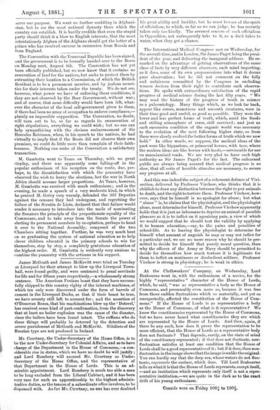The International Medical Congress met on Wednesday, for the seventh
time, and in London, Sir James Paget being the presi- dent of the year, and delivering the inaugural address. He re- marked on the advantage of getting observations of the same class of facts by very different observers, each mind importing, as it does, some of its own prepossessions into what it deems pure observation ; but he did not comment on the folly and unfairness committed by the Congress in excluding women doctors from their right to contribute such observa- tions. He spoke with extraordinary satisfaction of the rapid progress of medical science during the last fifty years. " We may read the history of the progress of truth in science as a palaeontology. Many things which, as we look far back, appear like errors, monstrous and uncouth creatures, were in their time good and useful, as good as possible. They were the lower and less perfect forms of truth, which, amid the floods and stifling atmosphere of error, still survived ; and just as each successive condition of the organic world was necessary to the evolution of the next following higher state, so from these were slowly evolved the better forms of truth which we now hold." In other words, we suppose, the medical ideas of the past were like hipparions, or primaeval horses, with toes, where the modern ideas are like horses with hoofs,—serviceable for use on macadamised roads. We are very glad to have such high authority as Sir James Paget's for the fact. The unlearned public are always being assured that medical progress is so slow, that all sorts of horrible stimulus are necessary, to secure any progress at all.






























 Previous page
Previous page